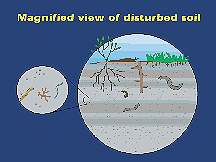      |
| |
|
|
|
|
|
| |
|
| Definition |
|
| All soils have basic physical,
chemical, and biological properties that influences development practices
and biological processes. The basic functions of soil are to regulate
water flow, store nutrients and water, act as a medium for plant growth,
and provide an environmental filter. Important health indicators include
those related to water storage and movement, soil structure, soil
stability, presence of nutrients, presence of toxic metals and chemicals,
availability of oxygen and gas exchange, diversity of organisms, presence
of organic matter. Many of these indicators are interrelated, such
as the effect of soil structure on water relating properties, and
the availability of nutrients with the presence of soil biota. The
best soil health indicators are those that integrate the combined
effects of several properties and processes. |
|
| |
|
|
|
|
| |
|
| Urban soils are disturbed
and changed by the process involved in the development of the urban
infrastructure and impose serious constraints on root systems, storm
water infiltration and organisms. Why? Natural profiles are rarely
present in urban soils. "In geologic terms, urban soils are recent
formations, and human activity has been the dominant geomorphic agent
in the development of these soils." (Smith 1998) Restrictions
in drainage and aeration of urban soils can be caused by these abrupt
textural and structural changes within the profile depth. |
|
| |
|
|



